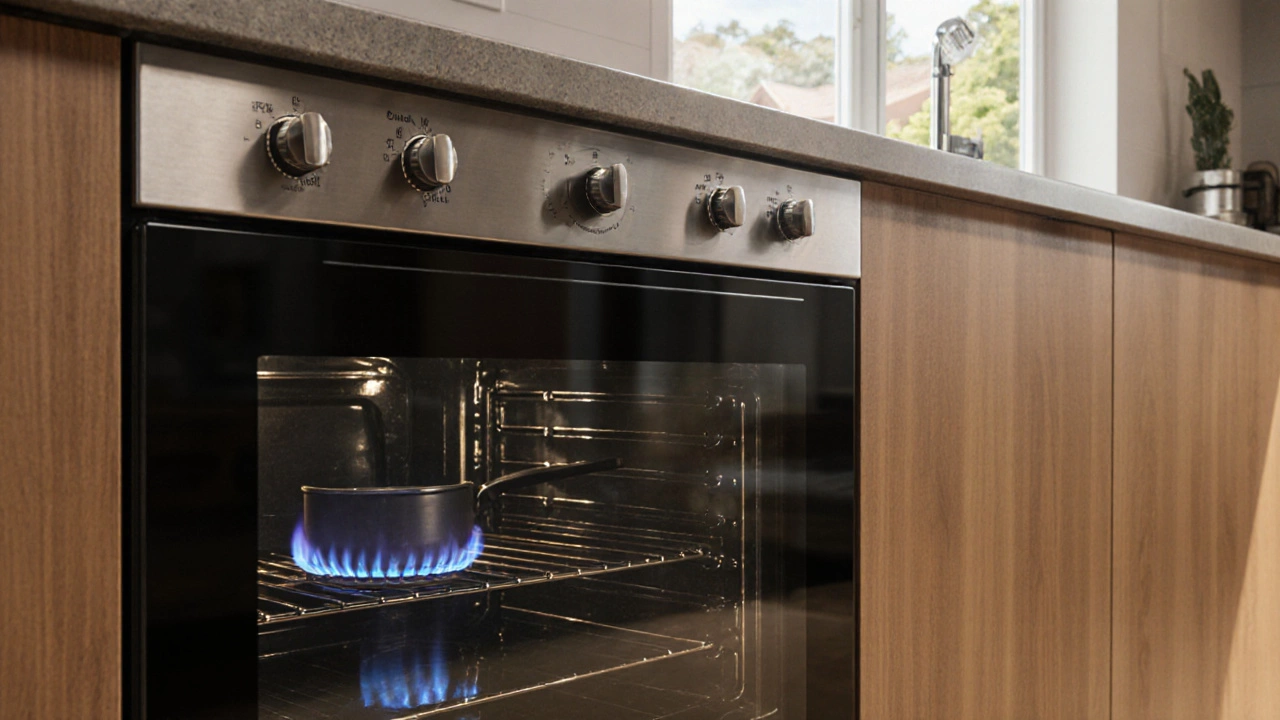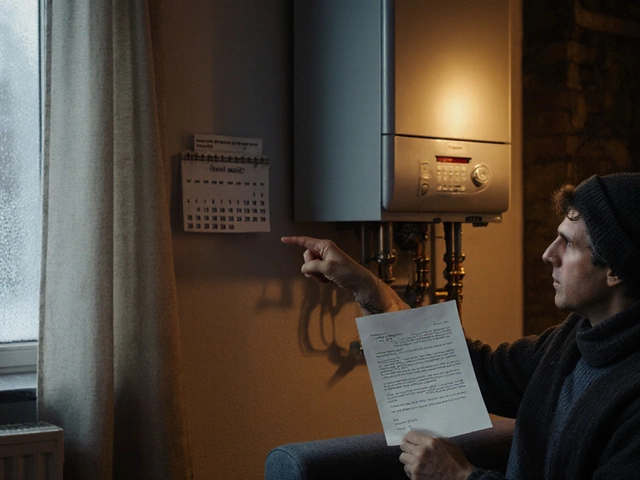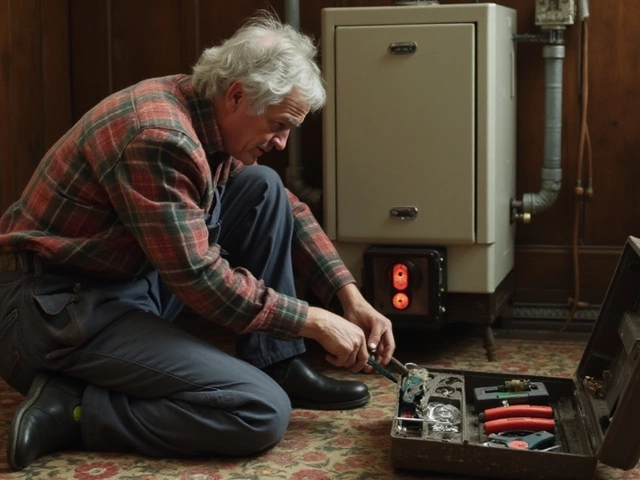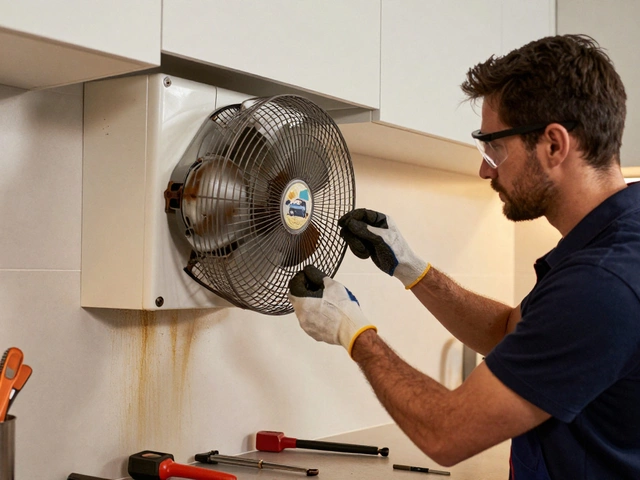Gas Oven Repair or Replacement Calculator
Oven Details
Decision Questionnaire
Answer yes/no to each question to assess your situation:
Is the oven less than 10–12 years old?
Is the estimated repair cost under 40% of a new oven price?
Are there no recurring safety issues (leaks, flame-out)?
Does the oven hold a 3-star or higher energy rating?
Do you have a licensed technician available?
Do you need the oven for a specific cooking style (e.g., convection) that the old one can't provide?
Recommendation
When cooking at home, a gas oven is a built‑in appliance that uses natural gas or LPG to generate heat for baking, roasting and broiling. It’s a staple in many Australian kitchens, especially in Adelaide where gas is often cheaper than electricity. But like any appliance, a gas oven can develop faults, and the big question pops up: gas oven repair - is it worth the money and hassle?
Quick Takeaways
- Repair is usually sensible if the oven is under 10‑12 years old and the fix costs less than 40% of a new unit.
- Safety regulations (AS/NZS5601) make professional help essential for gas‑related work.
- Energy‑efficient newer models can save $200‑$400 a year on gas bills, offsetting higher upfront costs.
- DIY fixes are limited to simple things like igniter cleaning; gas connections should never be self‑handled.
- When you replace, consider recycling the old oven to reduce landfill impact.
How a Gas Oven Works - The Basics
A gas oven has three core parts: the gas valve, the igniter and the oven cavity. When you turn the temperature dial, the valve releases a measured amount of gas. The igniter creates a spark, lighting the gas and heating the oven walls. Thermostats and safety cut‑offs keep the temperature steady and shut the gas off if flames go out.
Common Problems and What They Cost
Here’s a snapshot of the most frequent faults you’ll hear about in Adelaide and the typical price range for a qualified technician (2025 AUD):
| Problem | Cause | Average Repair Cost |
|---|---|---|
| Igniter won’t spark | Faulty igniter or wiring | $120‑$180 |
| No heat | Gas valve failure | $200‑$300 |
| Temperature fluctuations | Thermostat or safety cut‑off issue | $150‑$250 |
| Gas smell | Loose connection or cracked hose | $180‑$250 (plus safety inspection) |
| Door seal damage | Worn gasket | $80‑$130 |
All these jobs require a licensed gas appliance technician because working with pressurised gas is regulated under AS/NZS5601. Attempting a DIY fix on the valve or gas line can void warranties and, more importantly, be dangerous.
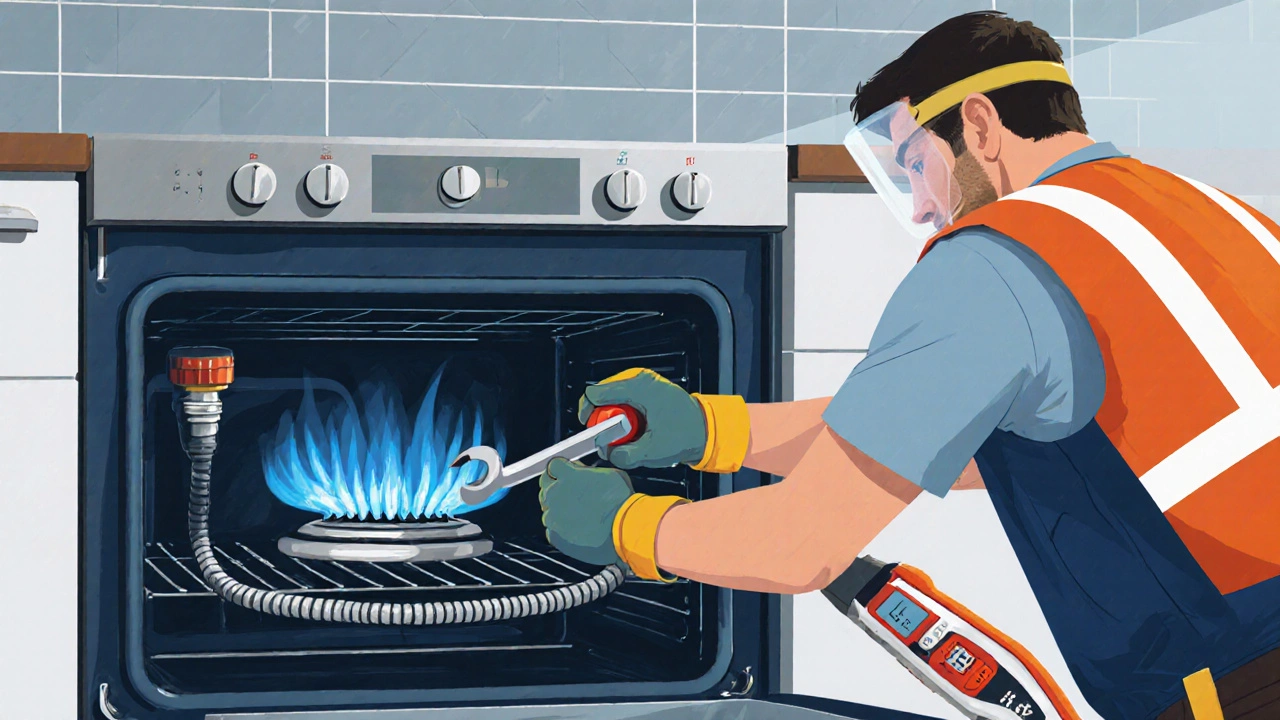
When Does Repair Make Sense?
Use this quick rule‑of‑thumb: if the repair total is less than 40% of a comparable new oven, keep the old one. Add a few extra considerations:
- Age of the oven: Most gas ovens last 12‑15 years with regular maintenance. If yours is younger than 10 years, parts are likely still available.
- Energy efficiency rating: Newer models often carry a 4‑star or 5‑star rating, meaning 10‑20% less gas usage. Over a five‑year period, that can pay back the higher purchase price.
- Frequency of breakdowns: If you’ve needed three or more repairs in the past 24 months, the appliance is probably on its last legs.
- Safety concerns: Any sign of gas leaks or a cracked burner should push you toward replacement, even if the repair cost is low.
Safety First - What the Regulations Say
In Australia, gas appliances are covered by the Gas Safety Regulation 2017 (SA) and the national standard AS/NZS5601. The key points for homeowners:
- Only a licensed gas fitter can service the gas valve, regulator or any part of the gas supply line.
- After any repair, the technician must issue a compliance certificate confirming the work meets safety standards.
- Annual safety checks are recommended for ovens older than 10 years.
Ignoring these rules isn’t just illegal - it can lead to carbon monoxide exposure, explosions, or costly insurance claims.
DIY vs Professional Repair
Let’s be honest: most homeowners love a good DIY project. For a gas oven, the safe DIY tasks are limited to:
- Cleaning the oven cavity and drip pans.
- Removing and cleaning the igniter (if the manufacturer’s manual says it’s user‑serviceable).
- Replacing the door gasket or control knobs.
Anything involving the gas valve, regulator or internal gas lines should be left to a licensed professional. The downside of hiring a pro is the cost, but the upside includes compliance, warranty protection and peace of mind.
Replacement Options - How They Stack Up
If you decide a new oven is the way to go, here’s a quick side‑by‑side look at three typical choices on the Australian market in 2025:
| Option | Up‑front Cost | Average Lifespan | Energy Savings (per yr) | Overall Value (5‑yr) |
|---|---|---|---|---|
| Repair (average $200) | $200 | 12‑15yrs | $0 | $200 |
| Entry‑level 4‑star model | $1,200 | 10‑12yrs | $150‑$200 | $1,550‑$2,000 |
| Premium 5‑star convection oven | $2,000 | 15‑20yrs | $250‑$300 | $2,750‑$3,500 |
Notice how the premium model, despite its higher price tag, starts paying back after about three years thanks to lower gas consumption. If you’re on a tight budget, the entry‑level 4‑star unit still offers decent savings and a modern safety system.
Environmental Impact - Why It Matters
Scrapping a functional oven adds to landfill waste and requires new raw materials. A repair extends the appliance’s life, cutting CO₂ emissions associated with manufacturing. However, if the repaired oven burns 15% more gas than a new 5‑star model, the long‑term environmental cost may outweigh the short‑term benefit. Aim for a balance: repair if the unit is efficient, replace if the inefficiency is glaring.
Decision Checklist - Should You Fix or Replace?
Grab a pen and tick off each item. If you get more ‘yes’ answers for repair, go ahead. If ‘no’ dominates, start browsing new models.
- Is the oven less than 10‑12years old?
- Is the estimated repair cost under 40% of a new oven price?
- Are there no recurring safety issues (leaks, flame‑out)
- Does the oven hold a 3‑star or higher energy rating?
- Do you have a licensed technician available?
- Do you need the oven for a specific cooking style (e.g., convection) that the old one can’t provide?
Final Thoughts
In most Adelaide households, a well‑maintained gas oven can serve another decade. If the fault is isolated, the repair bill stays modest and you stay compliant with safety standards. But when the appliance is aging, inefficient, or repeatedly breaking down, a new energy‑star model can lower your bills and give you peace of mind.
Frequently Asked Questions
How much does a typical gas oven repair cost in Adelaide?
Most common repairs - igniter replacement, valve fixes, or thermostat issues - range between $120 and $300. A licensed gas fitter will also include a safety inspection, which is mandatory under AS/NZS5601.
Can I replace the igniter myself?
If the oven’s manual lists the igniter as user‑serviceable, you can clean or swap it. However, most modern ovens require the gas valve to stay sealed, so it’s safer to let a professional handle any wiring or gas‑related steps.
What energy rating should I look for in a new gas oven?
Aim for a 4‑star or 5‑star rating. These ovens use 10‑20% less gas than older 2‑star models, translating to $200‑$400 savings over five years, depending on usage.
Is it legal to do any gas‑related work myself?
No. Australian law requires a licensed gas fitter for any work that involves the gas supply, valve, or regulator. Doing it yourself can breach the Gas Safety Regulation and void insurance.
Should I recycle my old oven?
Yes. Many councils run appliance recycling programs that safely dispose of metal and hazardous components. Recycling also reduces landfill waste and may earn you a small rebate.

